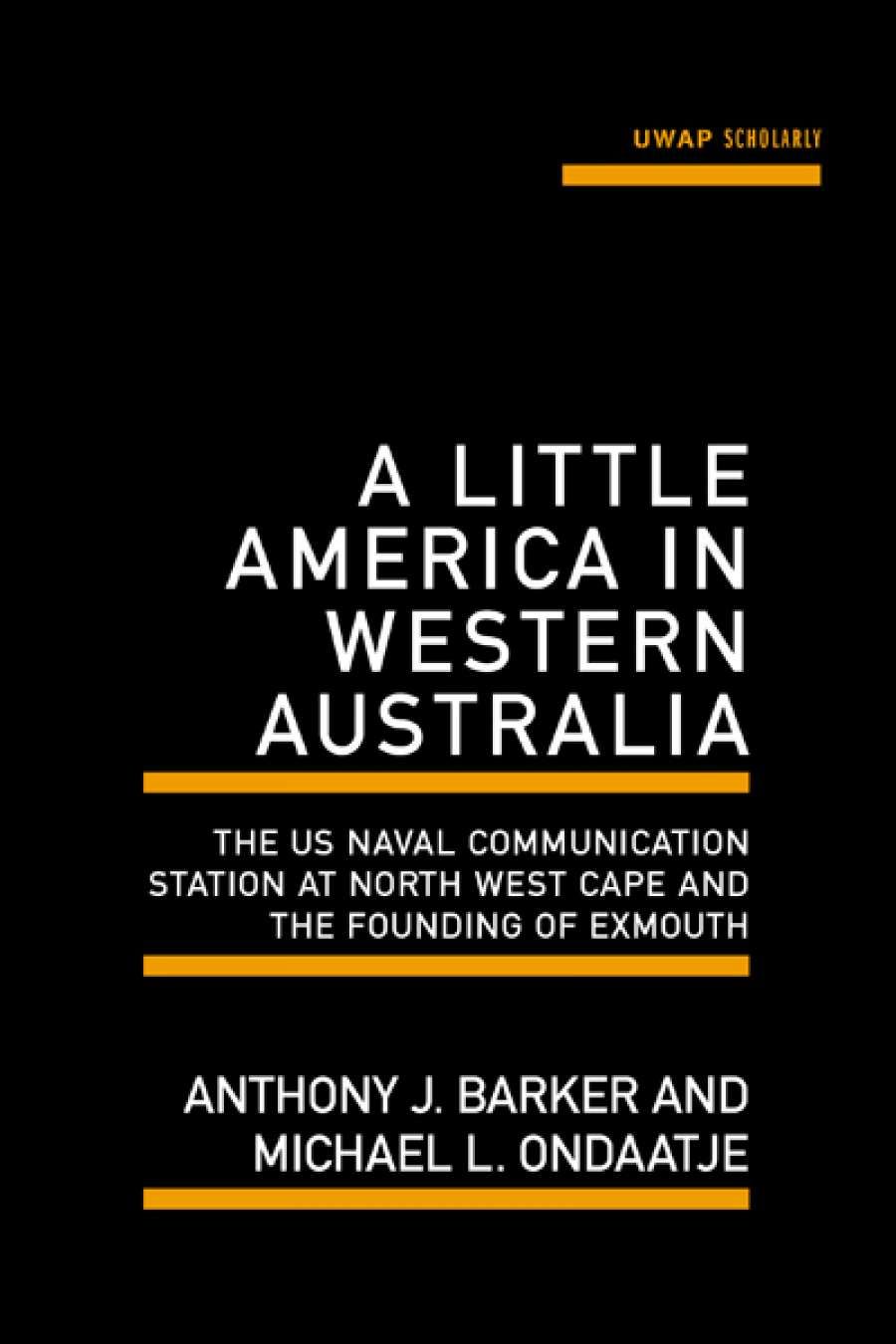
- Free Article: No
- Contents Category: Australian History
- Custom Article Title: Seumas Spark reviews 'A Little America in Western Australia' by Anthony J. Barker and Michael L. Ondaatje
- Book 1 Title: A Little America in Western Australia
- Book 1 Subtitle: The US Naval Communication Station at North West Cape and the Founding of Exmouth
- Book 1 Biblio: UWA Publishing, $45 pb, 350 pp, 9781742586854
The narrative draws on interviews with Australians and Americans who lived and worked at the Cape in the 1960s and 1970s. Herein lie the principal strengths of the book. Through these interesting reminiscences, we see how decisions made in Washington, Canberra, and Perth affected individuals and communities, and the ways in which the application of government policy involved a move from the general to the particular, the grand to the banal. In the early years at the Cape, amid lofty talk of alliances and mutual interests, governments and authorities bickered over who was responsible for what, who had authority over whom, and who should pay the bills: Exmouth endured a difficult birth. It is a shame the authors do not then consider, in detail, the lessons of North West Cape for present and future Australian and American governments. After the introduction, the deployment of marines to Darwin is not mentioned again until the conclusion, and then only briefly. A wider perspective would have been useful.
A more serious criticism applies to the manner in which the book is written. The authors seem determined to make use of every shred of research, to cram in as much detail as possible, even when topic and example are of tenuous relevance. Non sequiturs abound, while the need to connect disparate matters produces shaky links between sentences and paragraphs. Other problems arise from the arrangement of words and use of language. While individual testimonies are a strength of the book, the authors include too many quotations, citing verbatim comments that would be better paraphrased. The many sentences beginning with 'But' are a persistent distraction. So too is the use of 'no doubt' and its variations, along with other words and phrases used to qualify and speculate. For example: 'Whether they agreed with Murphy's decision, there can be little doubt that most Exmouth people would have dismissed as absurd the claims of a faraway "Stop Omega" campaigner if they had read them.'
 President Obama and Julia Gillard in Darwin, 17 November, 2011 (photograph by Sgt. Pete Thibodeau via Wikimedia Commons)
President Obama and Julia Gillard in Darwin, 17 November, 2011 (photograph by Sgt. Pete Thibodeau via Wikimedia Commons)
Other sentences jar. Why was red dust 'the bane of every woman' but not of every man? This is not nit-picking. The authors' inattention to language interrupts the flow of the book and blurs meaning. Sharp and extensive editing would have helped, and it seems this was a possibility. In the Acknowledgments, the authors mention that they rejected changes recommended by the editor.
Loose language is evident also in the discussion of politics and protest. The tenor of the book is conservative, the text informed by the premise, too rigid to be helpful, that critics of the communication station at North West Cape were misguided ideologues. Politicians and protestors who questioned the purpose and merits of the station, and the US military presence in Australia generally, are lumped together and dismissed as part of the 'radical left' and 'anti-American'. Who or what constituted the 'radical left' is not defined – 'left' and 'radical left' are used almost as synonyms – while the anti-US label is levelled too casually to be instructive. Members of the Australian Labor Party are depicted as dangerous renegades, despite acknowledgment that the position of the Whitlam government on North West Cape, rhetoric aside, was effectively the same as that of previous conservative administrations. And were the policies of Bill Hayden, as Labor leader, ever 'hard-left'? To question the ANZUS treaty and promise to close the station at North West Cape, as Hayden did in 1981, was not the talk of an inveterate radical. The problem here lies not with the politics – each to his or her own perspective – but in the use of words and labels that reveal more about the authors than about the complexities of history.
This book taught me the importance of the communication station to America, and much about Exmouth and the development of a community at North West Cape, but not what Australia as a nation gained from 'A Little America in Western Australia', other than the favour of a powerful friend. With thousands of US marines stationed in Darwin, it is a matter worth pondering.


Comments powered by CComment